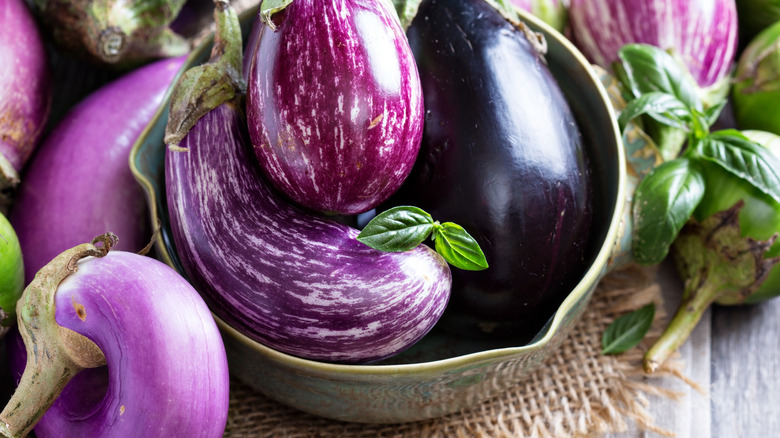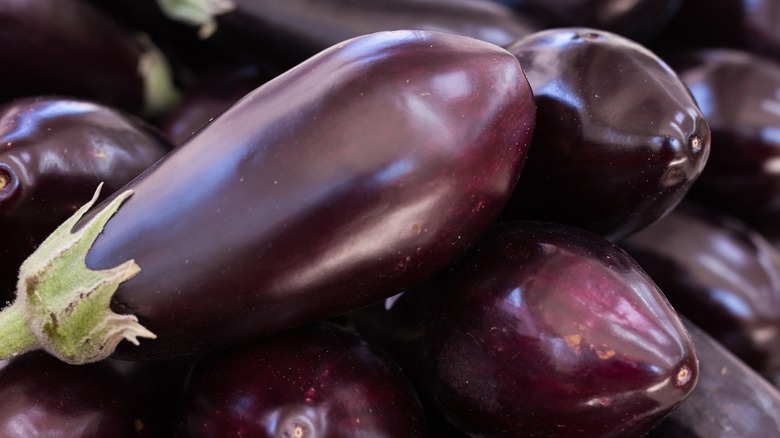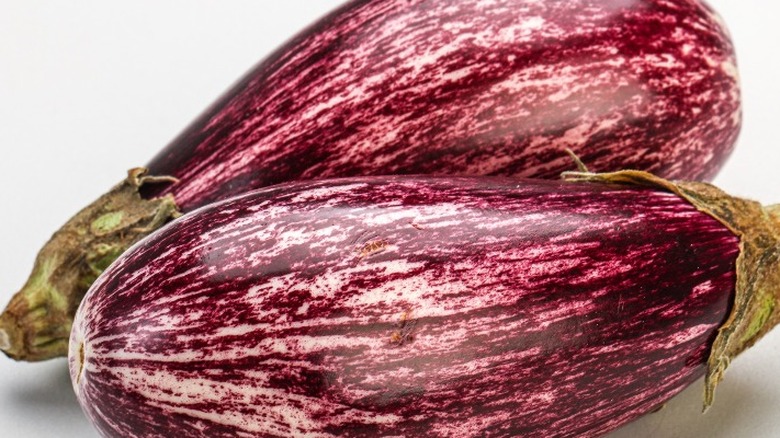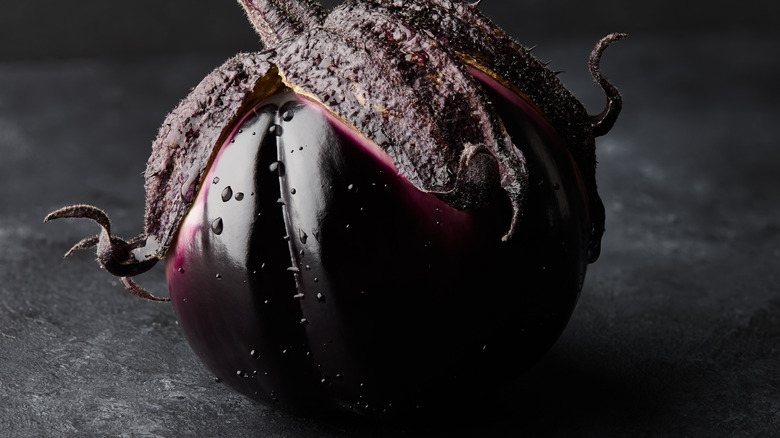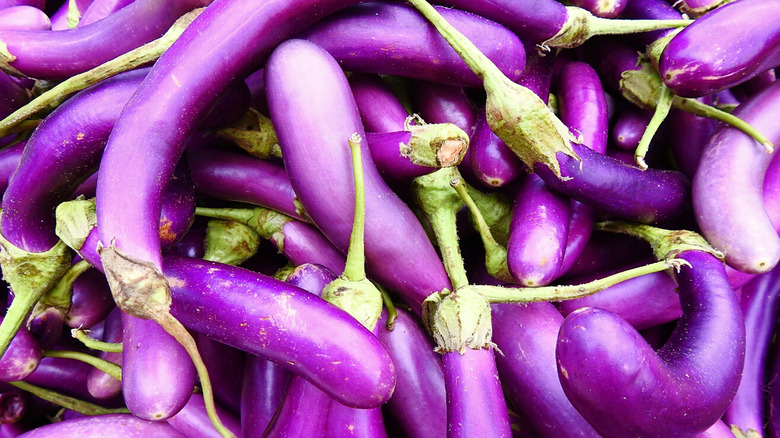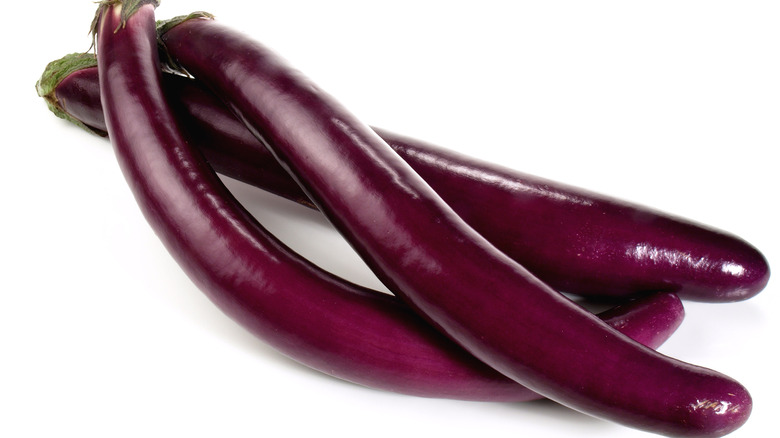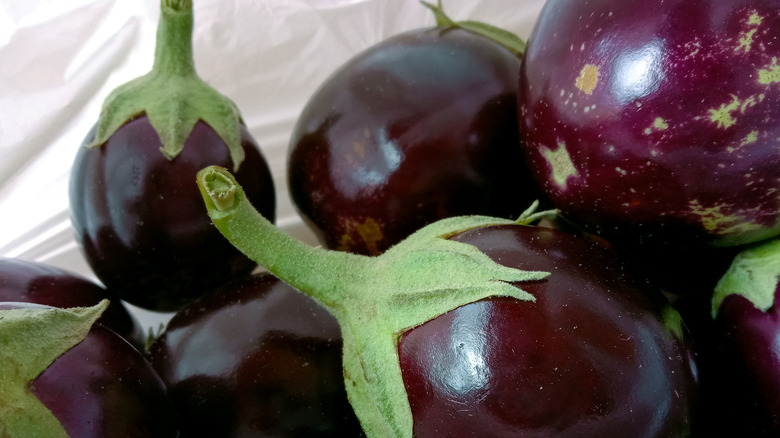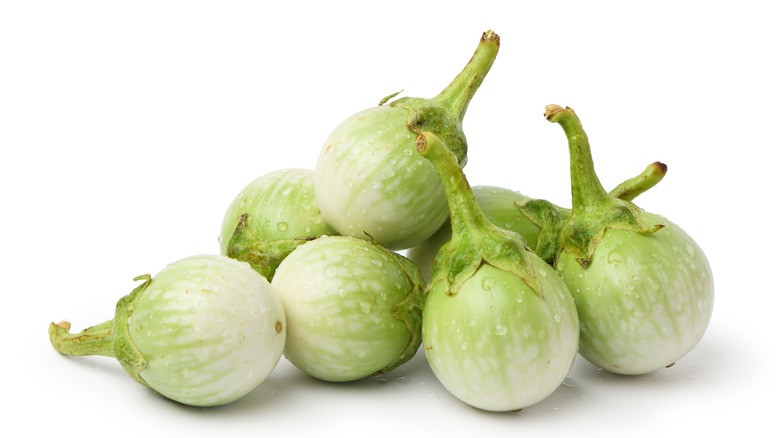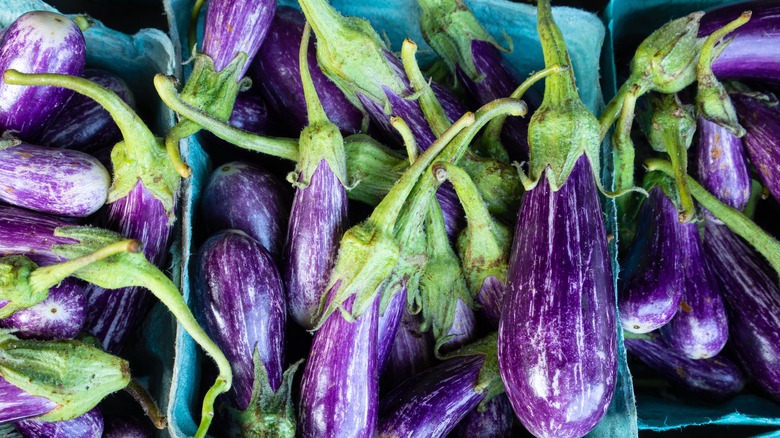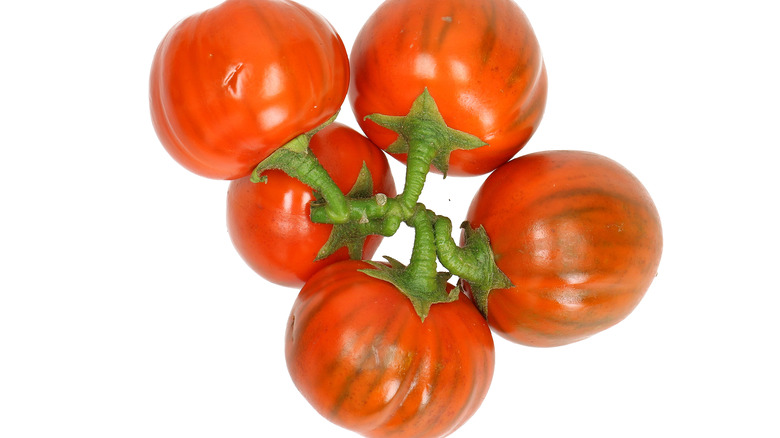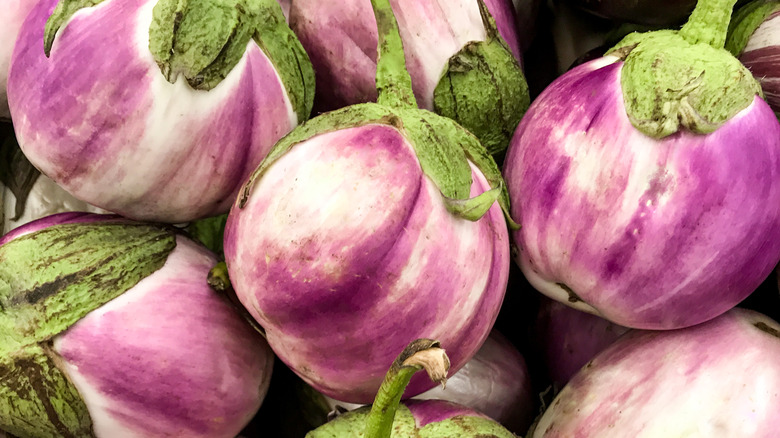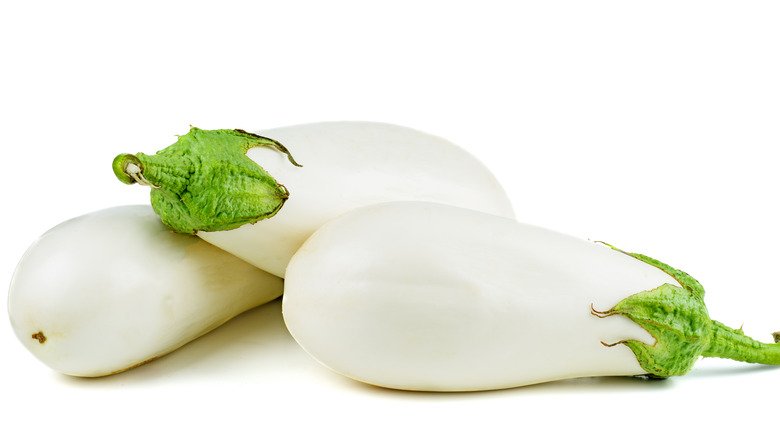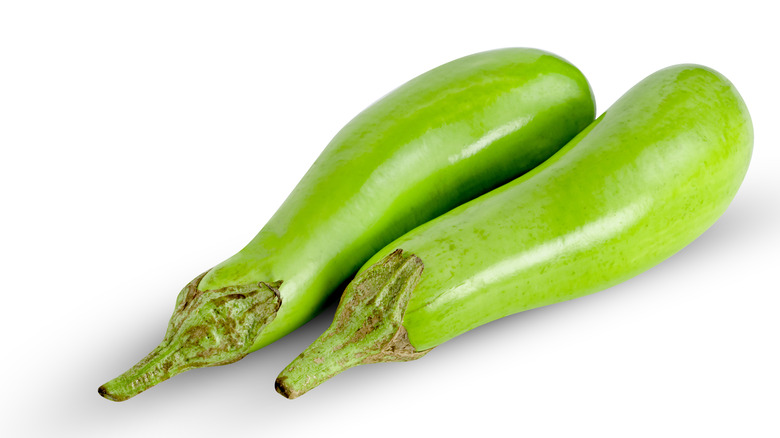12 Varieties Of Eggplants Explained
Suggestive emojis aside, actual eggplants are having a moment. Vegetarian cooks are discovering that the meaty texture stands up to grilling and is an excellent protein replacement. The spongier varieties absorb flavors beautifully, and make a stunning component to all your autumn curries and stews. We think they should be the darling of kitchens everywhere, but some people still haven't fallen for them. If you're on the fence about these gorgeously glossy nightshades, let us help you pick one perfect for your next meal.
If you're as excited about eggplants as we are, now's the time to discover one you've never tried before and give it a go; you'll even find a few hand-picked recipes for each of our choices. Keep in mind that, generally speaking, smaller varieties of eggplants will have thinner skin that won't need to be peeled, and they are usually less bitter (because they have fewer seeds and don't spend as long on the vine), too. And while eggplants are technically considered a berry, we're going the savory route and calling them vegetables here.
American eggplant
American eggplants are the ones that most of us know as the original eggplant. Also called globe eggplants, they're a deep, shiny shade of purple and a decent size with a slightly more elongated shape. They're perfect for use in nearly any dish calling for this ingredient but take care to choose ones that aren't too big, as the flesh may be tough. If you end up with a larger one, The Old Farmer's Almanac recommends discarding the peel altogether by simply removing it from the raw veggie or scooping out the cooked flesh after roasting or baking. Almanac also goes on to give this crucial tip about whole baking eggplant — first, pierce the skin a few times to allow steam to escape.
These particular nightshades are a terrific all-purpose choice but don't write them off as basic. Even the eggplant-averse will be wowed with this glamorous fall appetizer eggplant caponata crostini recipe because of the combination of flavors and textures. Globe eggplants are perfect for dishes that allow the vegetable to meld with other ingredients, letting the spongy and creamy flesh soak up whatever you add them to.
Graffiti eggplant
A type of Italian eggplant, graffiti (also called Sicilian) eggplant is striking with a striped purple and white flesh; less rounded, and with a shorter (some might even say squat), stature. When choosing any eggplant, especially those varieties with thicker skin, remember that smaller is often better for thinner skin and fewer seeds. According to Gardening Know How, graffiti eggplants, in particular, have been bred to create a sweeter flesh with much less bitterness than their wild relatives. The smooth interior makes these great for puréeing into baba ganoush recipes, but they're also great chopped into French ratatouille recipes where the softer textured flesh melts into a gorgeous butteriness.
These sweetly flavored delights with pleasingly creamy flesh are quick to cook through, so they work nicely when cooked hot and fast, as Leaf TV suggests. As another Italian variety, they're brilliant when paired with young cheeses, herbs like basil or oregano, and grilled proteins. As for frying in oil, graffiti eggplants are ideal for this application — their firmer (meaning less spongy) texture won't absorb as much oil, leaving them less greasy.
Barbarella eggplant
These stunning eggplants make a statement with their deep purple flesh, black calyxes, and lobed apple-like shape. Another type of Italian eggplant, the Barbarella variety, features a glimpse of bright white skin that highlights just how fetching their color is. A firm interior with quite a few seeds makes them, according to Kitchen Garden Seeds, a great option for stuffed eggplant dishes. Italian eggplants also work well, unsurprisingly, in dishes with tomato sauce and rich or salty cheese, like a classic eggplant parmesan recipe or added to a vegetable lasagna.
Typically, recipes using an Italian eggplant will instruct you to salt the flesh before cooking to tenderize it as well as lessen any bitterness. The Los Angeles Times keeps it simple for you — just salt your sliced eggplant and let rest for 60 minutes before quickly rinsing it clean under cool water. Otherwise, you can scoop out some of the bitter seeds if you're in a hurry. A baby-artichoke sandwich uses roughly chopped eggplant and comes together in a snap. While the instructions don't say to remove the seeds, feel free to discard them if you're worried about acrid flavors.
Chinese eggplant
Long and gracefully thin, Chinese eggplants are easy to identify. They're also a beautiful shade of bright lavender, making the fresh vegetable a standout in grocery stores and farmers' markets. The bright white inner flesh and near seedlessness make them, according to Specialty Produce, much less bitter than other types of eggplants. Specialty Produce further says that because this variety also possesses thinner skin, Chinese eggplants have a mild and sweet flavor. This can make the vegetable more appealing than varieties with a tougher exterior that will sometimes take on a bitter taste with age.
One of our favorite ways to use this lovely veggie is by tossing it into a recipe with spicy garlic sauce, using the complimentary flavors of ginger, chili paste, sesame oil, and rice vinegar. It's full of nutritious ingredients and tons of taste. While Chinese eggplant doesn't require salting, some recipes (like Hahn's) suggest it for releasing some of the water and keeping the sauce from being diluted.
Japanese eggplant
Now widely known in North America, Japanese eggplants are the long finger-sized type with a deep, dark purple sheen. The delicate skin, according to Melissa's Produce, gives a distinct tenderness with a smooth, creamy interior and a touch of sweetness. The thin shape and skin really help to reduce the cooking time for Japanese eggplant as well, making this fresh food a terrific choice for quick grilling or tossing into a flaming hot wok. We often favor grilling methods because these eggplants take on a gorgeous, smoky taste that goes well with dishes that include soy sauce or miso.
Like Chinese varieties, these make a good gateway eggplant if you're still not convinced of how fantastic nightshades can be. The variety also has fewer seeds (slightly more than the Chinese varieties), and you should find that helpful to keep bitterness down while also retaining the eggplant shape much more easily. Their smaller size and firm interiors make Japanese eggplant perfect for grilled eggplant with ponzu sauce or this charred eggplant kebab recipe. No need to peel, just slice and cook.
Indian eggplant
Indian eggplants, or brinjal (as per Garden.eco), are single-serving perfection. About the size of an egg, with all the recognizable traits of eggplant, they're just begging to be stuffed with a savory filling (think anything you could pack into that other famous stuffable nightshade plant — the red pepper) and served whole. You might also find them called baby eggplants because that's exactly what they look like. Calliope, the stunning striped variety, is quickly becoming more readily available in North America and is just as tasty, boasting a mild and buttery texture while retaining a firm flesh and delicate size, says Roger's Gardens.
In Southeast Asian cooking, they've long been a staple in curries and rice dishes because they don't need to be fussed over, just chopped up and dropped into a slow simmering pot. Try them in an incredibly delish Thai chicken curry recipe, where they add a sweet creaminess to the finished dish. Golden eggplant recipes use vadouvan spices for cooking for unbelievable flavor as well as a gorgeous golden finish, too.
Thai eggplant
Possibly the cutest eggplants on the list, the Thai variety is smaller, and rounder than the rest — picture a green and white ping-pong ball, and you've got a pretty good idea. And unlike most other eggplants, this variety can be eaten raw (try thinly slicing and dipping them into a superb nam prik ong for an outstanding appetizer) as well as grilled, tossed in stir-fries, or dipped in tempura batter. Indulge Bangkok suggests that the firm texture lends itself to long, slow cooking techniques such as currying, as these nightshades can absorb flavor without disintegrating. This means that Thai eggplants won't fade into the background like many other varieties and can be the star of the show.
Known as both round eggplant and ma keua praw (via The Royal Buddha) in Thai, these little beauts should be eaten while still young and fresh because, according to Indulge Bangkok, they become bitter and unpalatable as they age, which is why it's also suggested to consider pickling extras before they're too old to use.
Fairy Tale eggplant
As you might imagine, fairy tale eggplants have a rather charming appearance. Quaint, almost. Diminutive in size, the tiny nightshades are most often sold when they're only three to four inches long because, as Aero Gardens explains, that's when their tender-sweet flavor is at its peak. As you might expect, they have few seeds and cook quickly, making them a cinch to grill or roast as a quick weeknight side. These little lovelies have quickly become a favorite at farmers' markets; All-America Selections puts the success down to the fact that fairy tale eggplant is as tasty as they are pretty. While some recommend grilling whole, we suggest using them in moussaka recipes or simply breaded and fried.
The gorgeous deep purple and white striped flesh is delicate and thin, so handle them carefully before you prepare them. Another variety that doesn't need to be peeled; you can just slice and go. The tender flesh and quick cooking time make this vegetable fantastic for tossing into a stir fry. Remember, though, because of the small stature of fairy tale eggplant, you'll want to take care not to overcook, especially when using high-heat methods like grilling or roasting.
Turkish eggplant
Perhaps the most un-eggplant-looking eggplant on this list, the Turkish variety actually reminds us a lot of palm-sized pumpkins. Just look at them! The orange flesh develops green stripes as they mature (and develop more seeds) so look for ones that haven't gotten that far unless you're planning to stuff and roast 'em. In fact, Park Seed recommends using these vegetables while they're still green, verging on cream, for the best flavor and least bitterness.
If you think that you'll never come across these exotic veggies at your greengrocer, chances are that you just might — this variety, also known as Ethiopian or scarlet eggplant, is seeing a surge in popularity in North America after being featured on National Public Radio. Widely used across the Mediterranean and North Africa, you'll find that they work exceptionally well with flavors and ingredients from those areas, such as fennel, oregano, cinnamon, lemon, pine nuts, and Greek yogurt. Try it in a moussaka-inspired lamb stew recipe for a truly divine dinner.
Rosa Bianca eggplant
Rosa Bianca is an Italian heirloom eggplant with beautiful pink and white coloring and, in the words of Kitchen Garden Seeds, a lovely "Rubenesque" shape. These plump beauties are reminiscent of the Italian eggplants you're used to but with a far more tender and mildly flavored interior that makes them a perfect option for anyone who thinks they hate eggplant. However, like most eggplants, they're at their peak when the outer skin is still shiny and bright, as the skin tends to lose its sheen as the eggplant matures and toughens up. Shiny skin also signifies that the seeds are maturing and becoming bitter.
The simple fact that you can skip salting this variety means you can use them without loads of prep, making them perfect for a quick addition to your garlic focaccia pizza or grilled vegetable sandwich recipe. Coming in at a respectable mid-size (about 5 to 6 inches in diameter), they slice into decent servings but still make a great vehicle for stuffing with sausage and cheese or whatever else tickles your fancy.
White eggplant
White eggplant is a standout, for sure. Unlike all the deep purple or vibrant lavender nightshades on this list, these babies come in as a blank slate. As you might expect, white eggplant has a mild flavor while retaining the recognizable meaty texture of other eggplants. Fresh Culinair recommends that these eggplants be peeled before grilling, sautéeing, or chopping into a stir-fry. We feel that you can leave the skin on before roasting and scooping out the insides; otherwise, give it a once-over with your peeler, and don't look back.
The substantial texture and light flavor make the white eggplant a suitable choice in dishes like pasta alla Norma because it stands up well to being fried and simmered in sauce. Again, because of an inherent mildness, use this particular eggplant anywhere you want to showcase a particularly delicious sauce without too much competition from the other ingredients.
Green eggplant
Contrary to appearances, green eggplants aren't simply just underripe ones (we're looking at you, green peppers.) When fully ripe, the fresh veggies are a brilliant, verdant shade of unmistakable green. Compared to other types, the interior is quite dense and spongy (as per Just Go To Chef), giving them a firm structure that doesn't easily become soggy or flimsy. This makes them a perfect choice for long-simmering dishes or anytime you want your veggies to retain a bit of bite.
An Asian variety, these eggplants have been bred to be significantly less bitter and fibrous. Greens make a truly lovely addition to curries and work especially well when combined with Thai green curry paste in particular. They're also excellent when paired with tofu, sesame oil, miso, or tempura batter. However, like most of the eggplants on this list, green eggplants are pretty easily swapped for any other type mentioned in a recipe.
